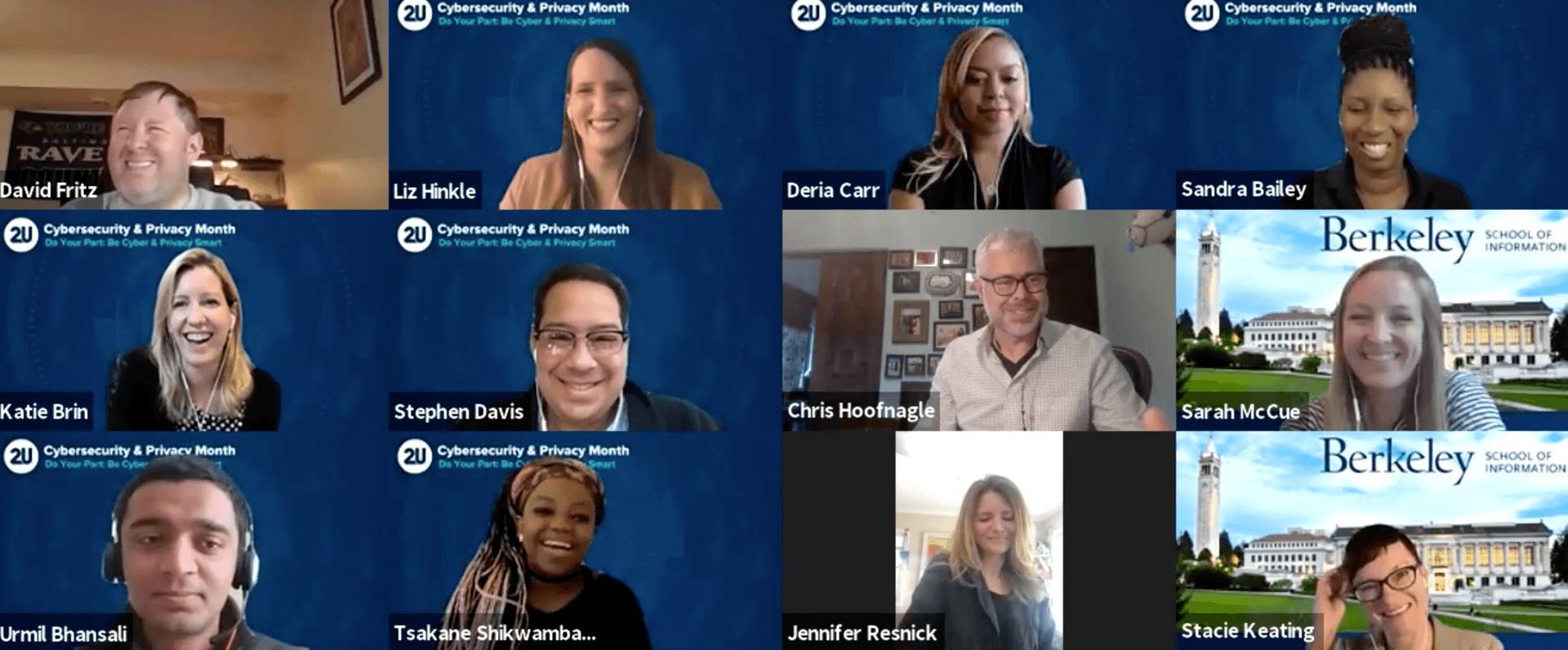Partner Spotlight
The Convergence of Law and Education Technology: A Conversation with UC Berkeley Professor Chris Hoofnagle
Written by Deria Carr on Oct 30, 2020
Related content: University, Digital Education

Each October, in tandem with National Cybersecurity Awareness Month, 2U hosts our own series of events to raise awareness about cybersecurity and privacy across the organization. As part of this effort, we hosted a discussion with Chris Hoofnagle, professor at University of California Berkeley Law School and instructor for the 2U-powered DataScience@Berkeley program, about technological developments in education and the impact of privacy regulations.
Professor Hoofnagle has over twenty years of experience in the industry, and through his work as an author, speaker, and educator, discussed his distinct perspective on the convergence of law and technology with 2U’s Chief Privacy Officer Katie Race Brin. Read on for key insights distilled from their live conversation on October 19.
The post-pandemic landscape of online education
At 2U, we have witnessed the power of online education firsthand. Average retention rates for adult learners across 2U’s university partner portfolio is 82%, beating comparable on-campus programs. Additionally, an Arizona State University study found that both higher retention and graduation rates were attributed to an online learning environment. As COVID-19 cases continue to skyrocket, many students have come to rely on digital education tools and platforms, and the amount of time students, parents, and faculty spend engaging online has followed suit.
A byproduct of increased digital interactions is more focused attention on education platforms acting as conduits between professor and student. Professor Hoofnagle suggests that education providers use technology in ways that are progressive and help optimize distance learning while maintaining the trust of those who use the platform, such as parents, students, and faculty. From his perspective, the key to online learning success is striking the right balance between innovation and security. The use of automated, evaluative technologies is another hot area of focus for educators as platforms should rate performance equitably—and not based on potentially flawed data without human interpretation or review.
A hybrid approach to privacy governance in emergent technologies
Emergent technologies, like facial recognition and artificial intelligence, require a proactive approach to privacy due to the inherent risks that lie therein. Recent enactment of revolutionary privacy laws, such as the California Consumer Privacy Act, the European Union’s General Data Protection Regulation, and the November 3 ballot option for California’s Proposition 24, demonstrate increased focus on privacy by legislatures and citizens. According to Professor Hoofnagle, this desire for more laws suggests that there exists a disconnect between traditional legal approaches to privacy regulation and expected outcomes. A procedural or even scientific methodology to preemptive rule creation may address some of the growing disparities and pave the way toward a more practical path to governing technological development.
Moreover, Professor Hoofnagle references varying socioeconomic factors across the US as an argument against a one-size-fits-all approach to privacy legislation. For some, privacy has served as a proxy used to navigate much deeper concerns about one's rights and relative standing in society. Privacy is not a privilege, but a right bestowed to all individuals despite their socioeconomic status. Undoubtedly, the convergence of intersectional perspectives is what will move the needle toward the next wave of comprehensive and inclusive privacy reform.
Data protection amid change
Professor Hoofnagle, who is in the midst of advising on high-level protection strategies for innovative and futuristic developments, offers two practical and important solutions for the ordinary tech user looking to safeguard personal information: use an ad-blocker and enable multi-factor authentication on your most frequently accessed accounts.
Moreover, Professor Hoofnagle states that enterprises should bolster their cybersecurity and data protection programs by developing a sophisticated defensive strategy that is on parity with their offense, as detailed in Robert Knake’s recent work, “The Fifth Domain.”
According to Professor Hoofnagle, online education providers will be required to continue evolving to meet the changing needs of transient users, such that stringent privacy and security measures are implemented and accessible across global borders. Distance learning solutions pose opportunities for the creation of progressive pedagogies that extend beyond the classroom while taking a privacy-centric approach to data protection.
Latest.
Learn more about us.
At 2U, we’re on a mission—to eliminate the back row in higher education and help universities thrive in the digital age. To learn more about who we are and what we do, follow the links below.